Methought - April/2025
Monthly wrap-up: Hemingway's and Woolf's nostalgia, romanticism in poetry and vampires, Cassavetes' creative process, and sad indie men with acoustic guitars.
Scroll down to read the English version
Caros leitores,
Apesar do inferno astral, abril foi um mês muito bom. Fiz algumas escolhas meio drásticas (é bom fazer isso pelo menos uma vez por ano para sentir que a vida está andando — não sei em que direção, mas parada não está). Estou orgulhosa da repercussão que o Guia de Shakespeare teve por aqui, e já estou trabalhando no próximo.
Sempre fico feliz e melancólica perto do meu aniversário, mas devo dizer que a vida está muito boa — minha nova realization é: esses são os meus “anos 80” (ou os roaring 20s), então tenho que viver consciente disso para não me tornar uma coroa com crise da meia idade lamentando não ter aproveitado essa época o suficiente. Por isso: leiam mas saiam de casa também! Conselho para mim e para vocês.
O poema do mês é de Mary Oliver, a escritora ideal para quem quer aprender a prestar atenção na vida.
LIVROS &TC
Sarrasine - Balzac (1830)
Um dos melhores contos que já li com relação à técnica de escrita. É possível perceber a mão de Balzac conduzindo todas as reações do leitor; como alguém que estuda literatura e escreve há um tempo, certos artifícios de escritores se tornam mais visíveis, e fiquei admirada com o nível de controle de Balzac: a construção de paralelos simbólicos, a escolha de colocar uma narrativa dentro de uma narrativa, o suspense e a revelação final—tudo feito com grande sofisticação, humor e perspicácia, o que me surpreendeu muito e me convenceu a encarar o imenso Ilusões Perdidas dele. Todo bom conto, justamente por ser curto, é a melhor aula de escrita (se você prestar atenção, claro).
Sarrasine começa com a aparição de um idoso misterioso (e meio macabro) em um baile, e continua com um personagem contando a outro a suposta história e identidade desse homem. O mistério é revalado num ótimo ritmo e apesar de ter parcialmente advinhado o segredo, ainda me surpreendeu.
Carmilla - Sherida LeFanu (1872)
Se Drácula fosse bom, seria que nem Carmilla. As histórias são muito semelhantes—até porque LeFanu influenciou Stoker—e por isso é difícil não ler fazendo uma comparação. Ainda assim, Carmilla é uma obra que se sustenta sozinha. É um livro muito bem escrito, gostei principalmente do quanto o autor pega emprestado da linguagem do Romantismo, desde descrições impressionistas da paisagem ao uso reiterado dos termos “sublime” e “pitoresco”. Os aspectos góticos também estão em destaque, com o cenário sendo um castelo centenário numa região remota da Áustria, com a duplicidade de identidades (repetição) e atmosfera onírica e, é claro, a figura do vampiro.
Nesta novela, vemos uma relação obsessiva entre duas jovens solitárias, Laura e Carmilla, e conforme essa relação se desenvolve, o mistério da narrativa se torna mais perigoso e macabro. Os aspectos queer existentes em Carmilla são incontestáveis. No entanto, é preciso estar atento à imposição de entedimentos sexuais contemporâneos em figuras históricas (pois Laura e Carmilla são inspiradas em mulheres reais)—um ponto de atrito para teóricos e historiadores queer—pois eu não qualificaria essa história como um romance lésbico; o desejo entre essas duas mulheres é claramente demonizado e moralmente condenado pelo autor, então não acho que é um bom exemplo de representatividade, apesar de ser historicamente interessante observar essa representação ainda que negativa.
LeFanu reitera até o fim a ambiguidade dos sentimentos de Laura sobre Carmilla, estabelecendo um forte paralelo entre desejo e repulsa (o que é visto também em Drácula, mas aqui achei mais bem feito, escrito com mais nuance). Talvez a maior força e magnetismo do vampiro seja o fato que ele é a cura para o medo que o homem tem de sua própria mortalidade (por oferecer uma possibilidade de eternidade, mesmo que deturpada). Em Carmilla há um duplo fascínio pelo proibido e imoral: existe o elemento queer e o elemento sobrenatural/demoníaco, representados como indissociáveis, o que é característico da história de vampiros.
Lyrical Ballads - William Wordsworth and Samuel T. Coleridge (1802)
Normalmente eu adoro poesia do romantismo inglês, mas não gostei muito desse livro. Sempre suspeitei (parte preconceito, parte intuição) que não ia gostar de Wordsworth, e agora confirmei minhas suspeitas. Acho a poesia dele pouco inventiva e muito repetitiva em comparação a Coleridge e Keats, os românticos que mais gosto.
Lyrical Ballads é a obra mais importante do Romantismo Inglês: uma coleção de poemas escrita em colaboração por Wordsworth e Coleridge (mas principalmente por Wordsworth). Meus poemas favoritos de Wordsworth foram: Expostulation and Reply, Tintern Abbey e Nutting. Todos os poemas possuem “argumentos” tais como o conflito primordial entre racionalidade e sensibilidade, uma espécie de causa do movimento romântico; ou como a disputa entre o conhecimento indireto obtido em livros (artificialmente) versus o conhecimento empírico obtido por estar na natureza. Esse argumento é uma reação romântica à dessensibilização do iluminismo excessivamente racional e da poesia da era Augusta. Gosto desse conceito, mas achei sua apresentação nos poemas um pouco enfadonha. Talvez eu tenha lido Lyrical Ballads rápido demais e isso prejudicou a minha apreciação da obra.
Paris é uma Festa - Ernest Hemingway (1964)
Eu imaginava que ia gostar de Paris é uma Festa, mas não esperava amar tanto. Foi um daqueles raros momentos em que um livro aparece exatamente na hora em que ele devia aparecer, nesse determinado contexto da minha vida, servindo de resposta inesperada a várias perguntas que eu ainda nem tinha formulado direito. Neste livro Hemingway narra, aos 60, o começo de sua vida de escritor em Paris quando tinha 20 e poucos anos, logo antes de publicar seu primeiro romance. Inclusive, é um recorte interessante pois, ao invés de nos contar como foi lidar com o sucesso com O Sol Também se Levanta depois de tanta preparação, ele termina o livro bem antes dessa mudança, com uma reflexão um tanto surpreendente. Hemingway parece dizer que sua época mais feliz foi antes da fama, com a primeira esposa e filho vivendo num apartamento minúsculo e frio em Paris, com dinheiro para comer apenas uma vez por dia e ninguém lendo o que escrevia. Claro que há uma dose pesada de nostalgia influenciando essa história, mas mesmo assim me deixou morrendo de inveja, pois a felicidade dessa época é profundamente encantadora e convicente. O romantismo desse livro é contagiante e me fez pensar que talvez o otimismo não seja uma perspectiva tão absurda assim. Estranho perceber que, dentre todos os autores que já li, Hemingway é um dos que mais me entende.
ARTIGOS, ENSAIOS, PALESTRAS &TC.
A Sketch of the Past - Virginia Woolf (1939)
Escrito dois anos antes da autora cometer suicídio, este pequeno ensaio começa com a premissa de haver um prazo para começar a escrever as próprias memórias por conta do esquecimento natural da mente envelhecida. Diante de tantas opções sobre como começar um memoir, Virginia decide narrar sua primeira memória a partir das flores na estampa do vestido da mãe. Ao longo do texto ela reflete sobre a natureza da memória em si e de como é difícil retratar fielmente quem você mesmo era no passado, e como você se sentiu. Me lembrou o “Return to Tipasa” de Camus, que falei sobre na newsletter de Março. Gosto muitíssimo desse tema visto que o registro da minha prórpia memória é quase uma obsessão minha, causado por um medo do esquecimento de si mesmo e de uma dificuldade de se definir que compartilho com Virginia. Além dessas considerações, Virginia relata uma triste memória de quando seu irmã mais velho a assediou sexualmente na infância, e como isso causou nela uma vergonha e um medo do próprio corpo. É um texto bem carregado emocionalmente, cheio de nostalgia e escrito de forma bastante lírica.
It is only by putting into words that I make it whole; this wholeness means that it has lost its power to hurt me; it gives me, perhaps by dooing so I take away the pain, a great delight to put the severed parts together. Perhaps this is the greatest pleasure known to me. It is the rapture I get when in writing I seem to be discovering what belongs to what; making a scene come right; making a character come together. From this I reach what I might call a philosphy; at any rate it is a constant idea of mine; that behind the cotton wool is hidden a pattern; that we—I mean all human beings—are connected with this; that the whole world is a work of art; that we are parts of the work of art. Hamlet or a Beethoven quartet is the truth about this vast mass that we call world. But there is no Shakespeare, there is no Beethoven; certainly and emphatically there is no God; we are the words; we are the music; we are the thing itself. And I see this when I have a shock.
Reading books is not just a pleasure: it helps our minds to heal - Peter Leyland para a Psyche Magazine (2025)
Biblioterapia parece meio bobo, mas é real. Este é o argumento de Peter Leyland, que neste texto relata como a leitura o ajudou em momentos psicologicamente difíceis e como ele passou a ensinar as pessoas a fazerem o mesmo. Ele usa exemplos de autores para explicar como a literatura vai além do entretenimento ou aprendizado formal, citando os “spots of time” de William Wordsworth, um elemento que ele encontrou na poesia, onde era possível se recuperar do estresse da vida e se recompor e reparar a si mesmo.
Adam’s Lecture on Plato and Enchantment
Faço parte do curso online de Adam há mais de um ano, e agora estamos na reta final de um módulo sobre “the poetics of enchantment”. Ele publicou os vídeos do curso no canal nele do YouTube (os debates depois é que são exclusivos da turma online), e eu recomendo demais assistirem. Foi por causa desse curso que eu acabei lendo A República de Platão, e ele também está no substack.
FILMES & SÉRIES
I’m Almost Not Crazy - The Making of John Cassavete’s Love Streams
Tem algumas pessoas cujo processo criativo é tão interessante para a mim quanto o resultado artístico. John Cassavetes é um deles; esse documentário/entrevista demonstra como foi o processo de filmagem de Love Streams (1984), último filme que ele fez antes de morrer. Muito do cinema dele é improvisado, e foi super interessante ver quais partes são feitas na hora. Gena Rowlands também aparece nesse documentário (maravilhosa) falando da atuação e das personagens iconicas que ela fez junto com Cassavetes.
High Fidelity - Stephen Frears (2000)
Neste filme John Cusack interpreta um dos personagens mais desprezíveis do cinema — para mim. Não tem nada pior do que um homem patético com tendências incel. Gosto muito da forma como o filme é narrado, com os relacionamentos do protagonista — dono de uma loja de discos — se misturando a músicas. É uma forma divertida de retratar como o pensamento desse personagem é pautado pela sua relação com a música, e como isso pode ser superficial e/ou distorcido. Nesse caso, ainda bem que a trilha sonora é ótima (Jack Black canta Let’s Get It On e é fantástico).
Ma Nuit Chez Maud - Eric Rohmer (1969)
Um homem está preso num apartamento de uma conhecida por causa de uma nevasca, na noite de natal, e eles passam a madrugada inteira conversando sobre os mais diversos assuntos, desde o Pensées de Pascal à moralidade da traição. Os filmes de Rohmer muitas vezes se resumem em boas conversas, e eu adoro o tipo de filme que é só gente falando coisas aleatórias e meio filosóficas, meio intelectuais, o tempo todo (é por isso que eu sempre gosto dos filmes de Woody Allen, infelizmente). Acho que hoje posso dizer que Rohmer é meu diretor favorito — depois de ter visto 16 de seus filmes e ter gostado de todos, acho que é uma afirmação válida — e Ma Nuit Chez Maud é um dos que mais gosto. Além disso, acho que é um dos mais acessíveis para quem nunca assistiu um filme dele e gostaria de começar.
The French Lieutenant’s Woman - Karel Reisz (1981)
Achei que era apenas um filme de época mas, para a minha surpresa, a narrativa tem elementos metalinguísticos ao colocar os atores principais, Jeremy Irons e Meryl Streep, interpretando atores que se apaixonam enquanto estão gravando o filme “The French Lieutenant’s Woman”, cujos personagens também se apaixonam. O filme dentro do filme é baseado em um livro, só que este livro também existe na vida real, escrito por John Fowles. É meio complicado de entender, eu sei. O roteiro foi escrito pelo dramatugo Harold Pinter, que fez um bom trabalho com toda essa confusão. Não amei o filme mas ele é bem interessante por conta dessa estrutura narrativa, além de possuir grandes atuações, principalmente de Meryl.
Monty Python’s The Meaning of Life - Terry Jones (1983)
Mas que filme absolutamente maluco — no bom sentido (na maioria das vezes). Eu gosto de loucuras intencionais que tem uma inteligência por trás, quando não é apenas absurdo por ser absurdo. Neste filme há muitas piadas e aberrações características de Monty Python e que talvez assustem um espectador que nãosaiba o que o espera. Composto de vários sketches meio dissonantes mas conectados por um aspecto existencialista/cosmológico, o filme começa bem, com uma hilária cena de abertura de uma batalha pirata entre burocratas idosos e empresários neoliberais, e termina se perdendo um pouco do meio pro fim. Ainda assim eu gostei, quero assistir The Holy Grail em seguida.
The Long Goodbye - Robert Altman (1973)
Eu amo The Long Goodbye e foi muito bom poder revê-lo depois de um tempo. Elliot Gould interpreta o detetive Phillip Marlowe, o clássico personagem das histórias de Raymond Chandler, neste neo-noir que termina sendo uma ótima comédia. Gould consegue interpretar Marlowe como um lorde e um mendigo ao mesmo tempo, o que é fantástico. Arnold Schwarzenegger é figurante nesse filme, inclusive. Sei que falei isso da última vez, mas preciso ver mais filmes de Robert Altman.
Mulholland Drive - David Lynch (2001)
Acho que David Lynch é o tipo de artista que você ama ou odeia; no caso, ama ou odeia a confusão incial que ele impõe no espectador. Vi esse filme pela primeira vez em casa há um ano atrás e não entendi praticamente nada, tanto que nem soube dizer se havia gostado ou não. Revi no cinema com meu namorado e nossa conversa depois do filme me ajudou a esclarecer certas coisas sobre o filme e assim apreciá-lo bem mais. Acho que esse é o tipo de obra que enriquece através do debate (Twin Peaks definitivamente é assim). Rever o filme me fez perceber (e admirar) as escolhas técnicas de Lynch para caracterizar o que era sonho e o que era realidade/memória (por exemplo, as cores são mais vibrantes na primeira metade, as atuações e diálogos mais teatrais). Não é um filme que me afeta emocionalmente, mas é, para mim, uma das obras mais interessantes do cinema.
MÚSICA & PODCASTS
Podcast interview with Joan Didion
Esse episódio foi gravado alguns antes de Didion falecer. Sempre me interesso por tudo que tem a ver com ela. Nessa entrevista ela revisita sua carreira desde o início, fala como começou a escrever e discute os textos que marcaram sua vida. Muita informação eu já tinha ouvido antes, então pode ser interessante para quem sabe pouco sobre a autora
Culto ao Autocontrole - Podcast Vibes em Análise
Sofro muito com perfeccionismo e tendências controladoras, e não querendo ser dramática mas esse episódio foi tudo que eu precisava ouvir. Devido ao nosso modo de vida contemporâneo, tenho uma mania de achar que todo sentimento ruim precisa ser imediatamente resolvido e suprimido; como se a ansiedade fosse culpa minha por não ter feito exercício naquela semana, ou ter dormido mal, ou não ter tomado um suco verde, ao invés de perceber que circunstâncias muito maiores e mais complexas que a minha rotina podem ser a verdadeira fonte do mal estar, e como esse impulso de nos culpar (e consequentemente responsabilizar) só piora essa angústia.
Bryter Layter - Nick Drake (1971)
Tenho escutado muito Nick Drake ultimamente porque ele me deixa de bom humor. Ouvir esse álbum enquanto caminho torna a vida instantaneamente mais bonita. Minhas favoritas de Bryter Layter são: Hazey Jane II, One Of These Things First, Poor Boy e Northern Sky.
Figure 8 - Elliott Smith (2000)
Em abril este álbum completou 25 anos e eu tirei um tempo para escutá-lo por inteiro novamente. Faz tempo que não falo sobre Elliott Smith por aqui, mas eu sou completamente apaixonada pelo trabalho dele. Figure 8 não é meu álbum favorito dele, mas tem músicas sensacionais e que são muito caras a mim, como: Everything Reminds Me Of Her, Stupidity Tries, L.A., Better Be Quiet Now e Cant Make A Sound.
Dear readers,
Despite being in zodiac hell, April was a very good month. I made some rather drastic choices (it's good to do this at least once a year to feel that life is moving - I don't know in which direction, but at least it's not stagnant). I'm proud of the response to The Shakespeare Guide here, and I'm already working on the next one.
I always get happy and melancholy around my birthday, but I have to say that life is pretty good - my new realisation is: these are my “the eighties” (or roaring twenties), therefore I have to live in awareness of this so that I don't become a midlife crisis hag regretting not having enjoyed this decade enough. So: read, but get out of the house too! Advice for me and you. Like Frank O’Hara, I’m also looking for a “sign that people do not totally regret life”
The poem of the month is by Mary Oliver, the ideal writer for anyone who wants to learn to pay attention to life.
BOOKS &TC
Sarrasine - Balzac (1830)
One of the best short stories I've ever read in terms of writing technique. You can clearly see Balzac's hand guiding all the reader's reactions; as someone who has been studying literature and writing for a while, certain writers' tricks become more visible, and I was amazed at Balzac's level of control: the construction of symbolic parallels, the choice to place a narrative within a narrative, the suspense and the final revelation—all done with great sophistication, humour and insight, which convinced me to tackle his immense Lost Illusions. Every good short story, precisely because it's short, can be the best writing lesson (if you pay attention, of course).
Sarrasine begins with the appearance of a mysterious (and somewhat macabre) old man at a ball, and continues with one character telling another the old man's supposed history and identity. The mystery is played out at a great pace, and although I had partially guessed the secret, it still astonished me.
Carmilla - Sherida LeFanu (1872)
If Dracula were any good, it would be like Carmilla. The stories are very similar—given that LeFanu influenced Stoker—so it's hard not to read them in comparison. Even so, Carmilla stands on its own. It's a very well-written book, and I especially liked how much the author borrows from the language of Romanticism: from impressionistic descriptions of the landscape to the repeated use of the ‘sublime’ and ‘picturesque’. Gothic aspects are also emphasised, with the setting being a centuries-old castle in a remote region of Austria, with the duplicity of identities and oneiric atmosphere and, of course, the figure of the vampire.
In this novella, we follow an obsessive relationship between two lonely young women, Laura and Carmilla. As this relationship develops, the mystery of the narrative becomes more dangerous and macabre. The queer aspects of Carmilla are undeniable. However, you have to be wary of the imposition of contemporary sexual understandings on historical figures (as Laura and Carmilla are inspired by real women)—a sticking point for queer theorists and historians—as I wouldn't classify this story as a lesbian romance; the desire between these two women is clearly demonised and morally condemned by the author, so I don't think it's a good example of representativity, although it is historically interesting.
LeFanu reiterates the ambiguity of Laura's feelings about Carmilla to the end, establishing a strong parallel between desire and repulsion (which is also seen in Dracula, but here I thought it was better done, written with more nuance). Perhaps the vampire's greatest strength and magnetism is the fact that he is the cure for man's fear of his own mortality (because he offers the possibility of eternity, however distorted). In Carmilla there is a double fascination with the forbidden and the immoral: there is the queer element and the supernatural/demonic element, represented as indissociable, which is characteristic of vampire stories.
Lyrical Ballads - William Wordsworth and Samuel T. Coleridge (1802)
I usually love English Romantic poetry, but I didn't enjoy this book very much. I always suspected (part prejudice, part intuition) that I wouldn't like Wordsworth, and now my suspicions have been confirmed. I find his poetry mostly uninventive and repetitive compared to Coleridge and Keats, the Romantics I like best, which is a pity since I wanted to like him.
Still, Lyrical Ballads is the most important work of English Romanticism: a collection of poems written in collaboration by Wordsworth and Coleridge (but mainly by Wordsworth). My favourite Wordsworth poems were Expostulation and Reply, Tintern Abbey and Nutting. All the poems have ‘arguments’ such as the primary conflict between rationality and sensibility, a kind of cause of the Romantic movement; or the dispute between indirect knowledge obtained in books (artificially) versus empirical knowledge obtained by being in nature. This argument is a romantic reaction to the disembodiment of the excessively rational Enlightenment movement and the poetry of the Augustan age. I like this concept, but thought its presentation in the poems was a little tedious. Perhaps I've read Lyrical Ballads too fast, spoiling my appreciation of the work.
A Movable Feast - Ernest Hemingway (1964)
I knew I would like A Movable Feast, but I didn't expect to love it so much. It was one of those rare moments when a book appears exactly when it should, in this particular context of my life, serving as an unexpected answer to several questions that I hadn't even formulated properly. In the book, Hemingway recounts, at the age of 60, the beginning of his life as a writer in Paris when he was in his early 20s, just before publishing his first novel. In fact, it's an interesting snapshot because, instead of telling us what it was like to deal with the success of The Sun Also Rises after so much anticipation, he ends the book just before this event, with a rather surprising reflection. Hemingway seems to express that his happiest time was before his fame, with his first wife and son living in a tiny, cold flat in Paris, with enough money to eat only once a day and nobody to read what he wrote. Of course, there’s a heavy dose of nostalgia influencing the story, but it still left me envious, because the happiness of that era is deeply charming and convincing. The romanticism of this book is contagious and made me think that perhaps optimism isn't such an absurd perspective. It's strange to realise that of all the authors I've ever read, Hemingway understands me the most.
ARTICLES, ESSAYS, LECTURES &TC.
A Sketch of the Past - Virginia Woolf (1939)
Written two years before the author committed suicide, this autobiographical essay begins with the premise that there is a deadline to start writing one's own memoirs because of the natural forgetfulness of the ageing mind. Faced with so many options on how to begin, Virginia decides to narrate her first memory from the flowers on the print of her mother's dress. Throughout the piece, she reflects on the nature of memory itself and how difficult it is to faithfully portray who you were in the past and how you felt. It reminded me of Camus' ‘Return to Tipasa’, which I discussed in March's newsletter. This subject is dear to me because recording my own memory is almost an obsession of mine, motivated by a fear of forgetting and a difficulty in defining oneself that I share with Virginia. In addition to these considerations, Virginia recounts a sad memory of when her older brother sexually harassed her as a child, and how this caused her to feel ashamed and afraid of her own body. It's an emotionally charged text, full of nostalgia and written very lyrically.
It is only by putting into words that I make it whole; this wholeness means that it has lost its power to hurt me; it gives me, perhaps by dooing so I take away the pain, a great delight to put the severed parts together. Perhaps this is the greatest pleasure known to me. It is the rapture I get when in writing I seem to be discovering what belongs to what; making a scene come right; making a character come together. From this I reach what I might call a philosphy; at any rate it is a constant idea of mine; that behind the cotton wool is hidden a pattern; that we—I mean all human beings—are connected with this; that the whole world is a work of art; that we are parts of the work of art. Hamlet or a Beethoven quartet is the truth about this vast mass that we call world. But there is no Shakespeare, there is no Beethoven; certainly and emphatically there is no God; we are the words; we are the music; we are the thing itself. And I see this when I have a shock.
Reading books is not just a pleasure: it helps our minds to heal - Peter Leyland for Psyche Magazine (2025)
Bibliotherapy sounds a bit silly, but it's real. This is the argument of Peter Leyland, who in this essay tells how reading helped him through psychologically difficult times and how he went on to teach people to do the same. He uses examples of authors to explain how literature goes beyond entertainment or formal learning, citing William Wordsworth's ‘spots of time’, an element the author found in poetry, where it was possible to recover from the stresses of life and recompose and repair oneself.
Adam’s Lecture on Plato and Enchantment
I've been part of Adam's online course for over a year, and we're now in the final stretch of a module on ‘the poetics of enchantment’. He has posted the course videos on his YouTube channel (the discussions afterwards are exclusive to the online class, which can be accessed through a membership), and I highly recommend watching them. It was because of this course that I ended up reading Plato's Republic, and he's also on Substack at
.FILMS & SERIES
I’m Almost Not Crazy - The Making of John Cassavete’s Love Streams
There are some people whose creative process is as interesting to me as their artistic output. John Cassavetes is one of them; this documentary/interview shows what the filming process was like for Love Streams (1984), the last film he made before his death. Much of his cinema is improvised, and it was super interesting to see which parts were made on the spot. Gena Rowlands (queen) also appears in this documentary, talking about acting and the iconic characters she played alongside Cassavetes.
High Fidelity - Stephen Frears (2000)
In this film, John Cusack plays one of the most despicable characters in cinema—for me. There's nothing worse than a pathetic man with incel tendencies. I really like the way the film is narrated, with the relationships of the protagonist—a record shop owner—mixed in with the music. It's a fun way of portraying how this character's thinking is guided by his relationship with music, and how superficial and/or distorted this can be. In this case, it's a good thing that the soundtrack is great (Jack Black sings Let's Get It On and it's fantastic).
Ma Nuit Chez Maud - Eric Rohmer (1969)
A man is stuck in an acquaintance's flat because of a blizzard on Christmas Eve, and they spend the whole night talking about the most diverse subjects, from Pascal's Pensées to the morality of betrayal. Rohmer's films often boil down to good conversations, and I love the kind of film that is just people talking about random, half-philosophical, half-intellectual things all the time (which is why I always enjoy Woody Allen's films, unfortunately). I think I can now say that Rohmer is my favourite director - after seeing 16 of his films and loving them all, I guess that's a valid statement—and Ma Nuit Chez Maud is one of my favourites. Besides, I think it's one of the most accessible for those who have never seen one of his films and would like to start.
The French Lieutenant’s Woman - Karel Reisz (1981)
I thought it was just a period drama but, to my surprise, the narrative has metalinguistic elements by having the main actors, Jeremy Irons and Meryl Streep, play actors who fall in love while they are recording the film ‘The French Lieutenant's Woman’, whose characters also fall in love. The film within the film is based on a book, but this book also exists in real life, written by John Fowles. It's a bit complicated to understand, I know. The script was written by playwright Harold Pinter, who did a good job with all the confusion. I didn't love the whole film, but it's very interesting because of its narrative structure, as well as its great performances, especially from Meryl.
Monty Python’s The Meaning of Life - Terry Jones (1983)
What an absolutely insane film—in a good way (most of the time). I like intentional nonsense that has an intelligence behind it, when it's not just absurd for the sake of being absurd. The many jokes and aberrations characteristic of Monty Python might scare a viewer who doesn't know what's in store. Composed of several sketches that are somewhat dissonant but connected by an existentialist/cosmological aspect, the film starts well, with a hilarious opening scene of a pirate battle between elderly bureaucrats and neoliberal businessmen, and ends up getting a little lost from the middle to the end. I still enjoyed it, and I want to watch The Holy Grail next.
The Long Goodbye - Robert Altman (1973)
I love The Long Goodbye and it was great to be able to see it again after a while. Elliot Gould plays detective Phillip Marlowe, the classic character from Raymond Chandler's stories, in this neo-noir that ends up being a terrific comedy. Gould manages to play Marlowe as a lord and a beggar at the same time, which is fantastic. Arnold Schwarzenegger is an extra in this film, by the way. I know I said this last time, but I need to see more of Robert Altman's films.
Mulholland Drive - David Lynch (2001)
I think David Lynch is the kind of artist you either love or hate; in this case, you love or hate the initial confusion he imposes on the viewer. I saw this film for the first time at home a year ago and understood practically nothing, so much so that I couldn't tell whether I liked it or not. I saw it again at the cinema with my boyfriend, and our conversation after the film helped me to clarify certain things about the film and appreciate it much more. I think this is the kind of thing that is enriched through debate (Twin Peaks is definitely like that). Reviewing the film made me realise (and admire) Lynch's technical choices to characterise what was dream and what was reality/memory (for example, the colours are more vibrant in the first half, the acting and dialogue more theatrical). It's not a film that affects me emotionally, but it is, for me, one of the most interesting works in cinema.
MUSIC & PODCASTS
Podcast interview with Joan Didion
This episode was recorded just before Didion passed away. I'm always interested in anything to do with her. In this interview, she revisits her career from the beginning, talks about how she started writing and discusses the pieces that marked her life. A lot of the information I'd heard before, so it might be interesting for those who know little about the author.
Culto ao Autocontrole (The Cult of Self Control) - Podcast Vibes em Análise
I suffer a lot from perfectionism and controlling tendencies, and not to be dramatic, but this episode was everything I needed to hear. Due to our contemporary way of life, I have a habit of thinking that every bad feeling needs to be immediately resolved and suppressed; as if the anxiety was my fault for not exercising that week, or not sleeping well, or not drinking a green juice, instead of realising that circumstances much bigger and more complex than my routine can be the real source of the discomfort, and how this impulse to blame ourselves (and consequently take responsibility) only worsens this anguish. This podcast is in Portuguese.
Bryter Layter - Nick Drake (1971)
I've been listening to a lot of Nick Drake lately because he puts me in a good mood. Listening to this album while walking makes life instantly more beautiful. My favourites from Bryter Layter are: Hazey Jane II, One Of These Things First, Poor Boy and Northern Sky.
Figure 8 - Elliott Smith (2000)
In April, this album turned 25 and I took the time to listen to it again in its entirety. It's been a while since I've talked about Elliott Smith here, but I'm completely in love with his work. Figure 8 isn't my favourite of his albums, but it has some great songs that are very close to my heart, such as Everything Reminds Me Of Her, Stupidity Tries, L.A., Better Be Quiet Now, and Cant Make A Sound.








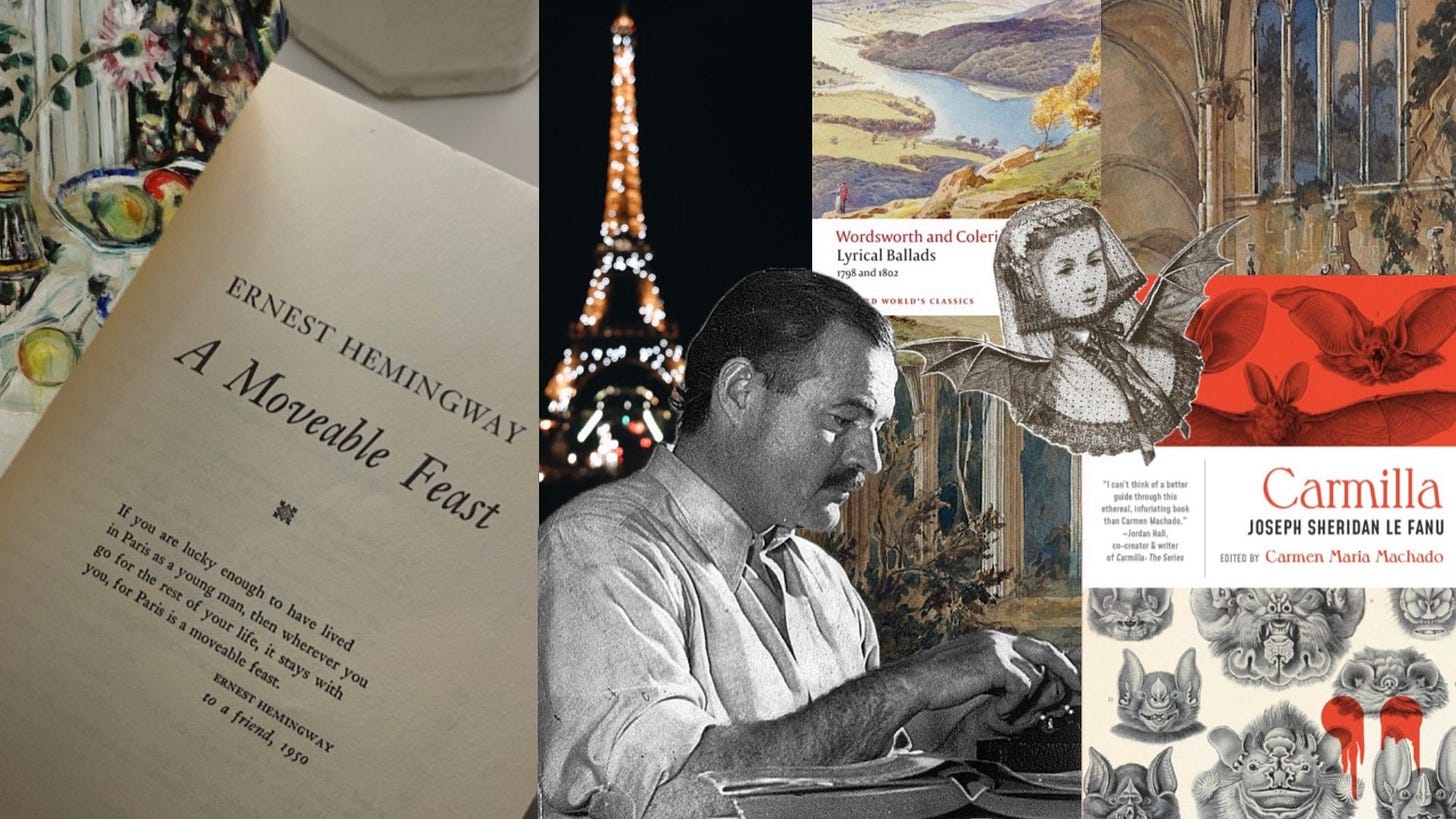
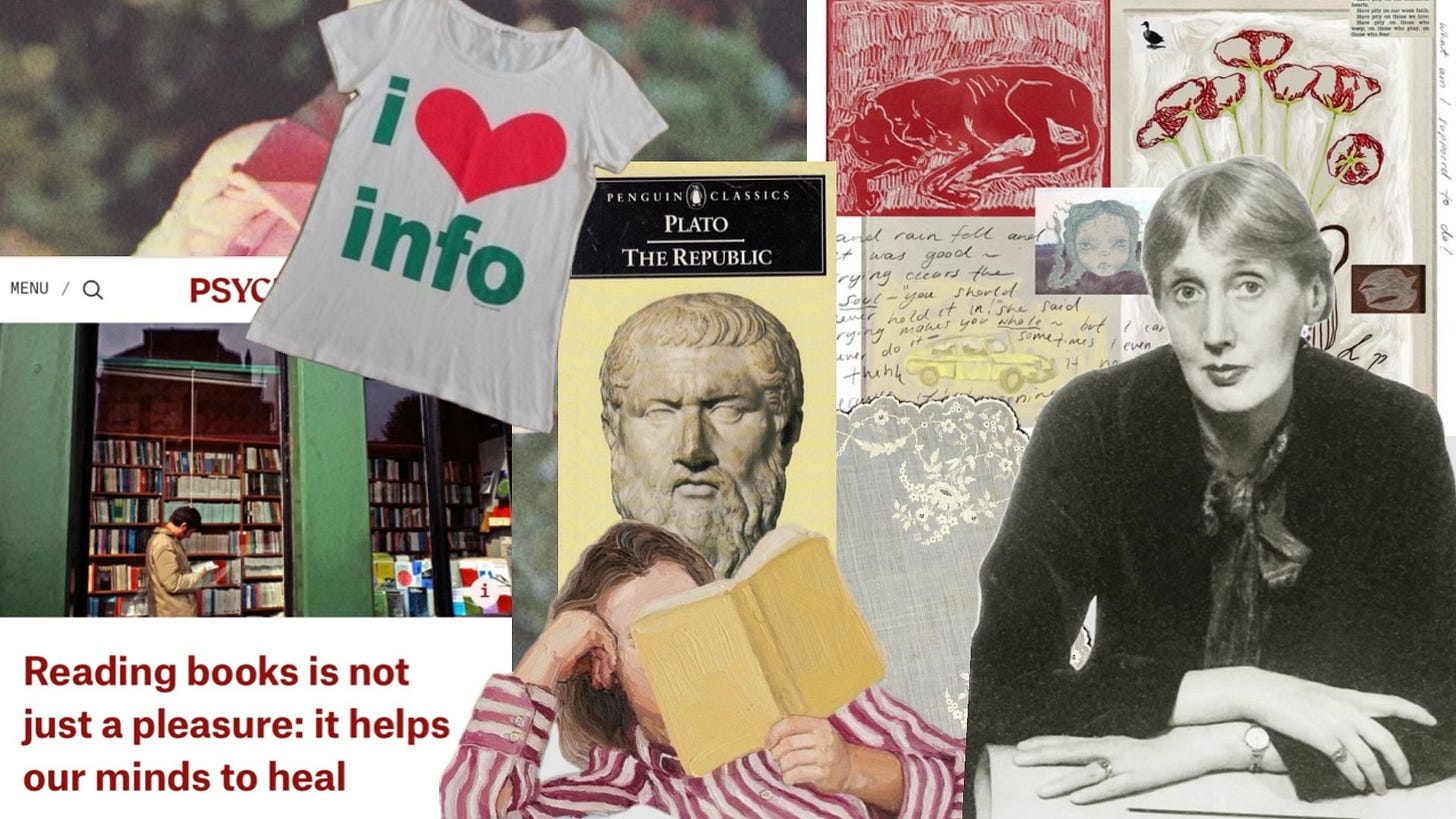

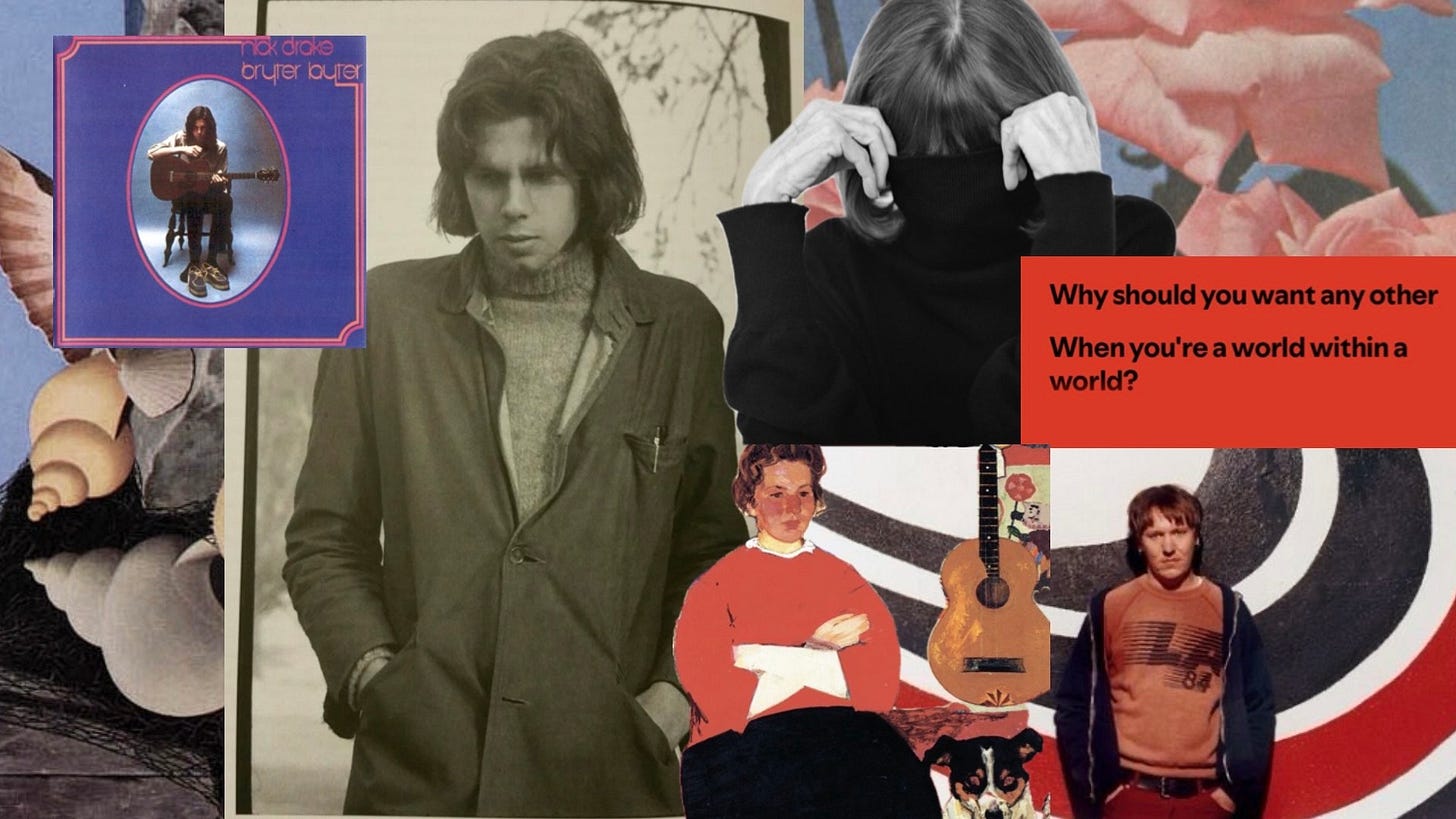
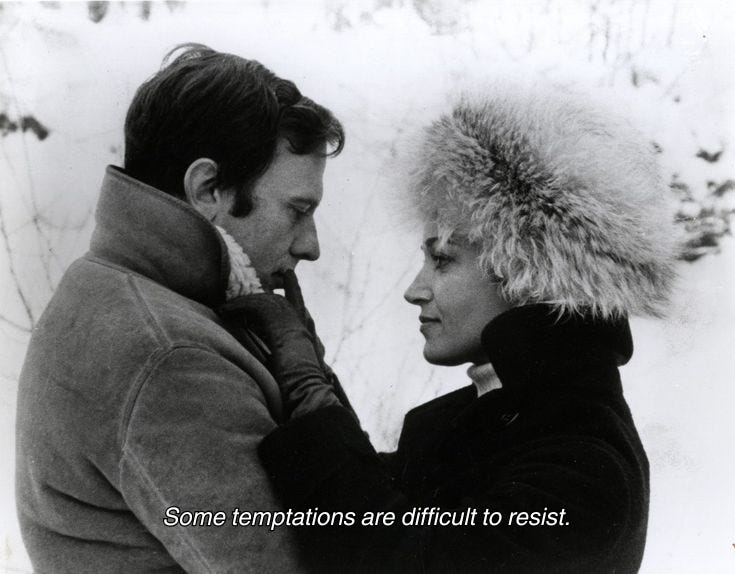

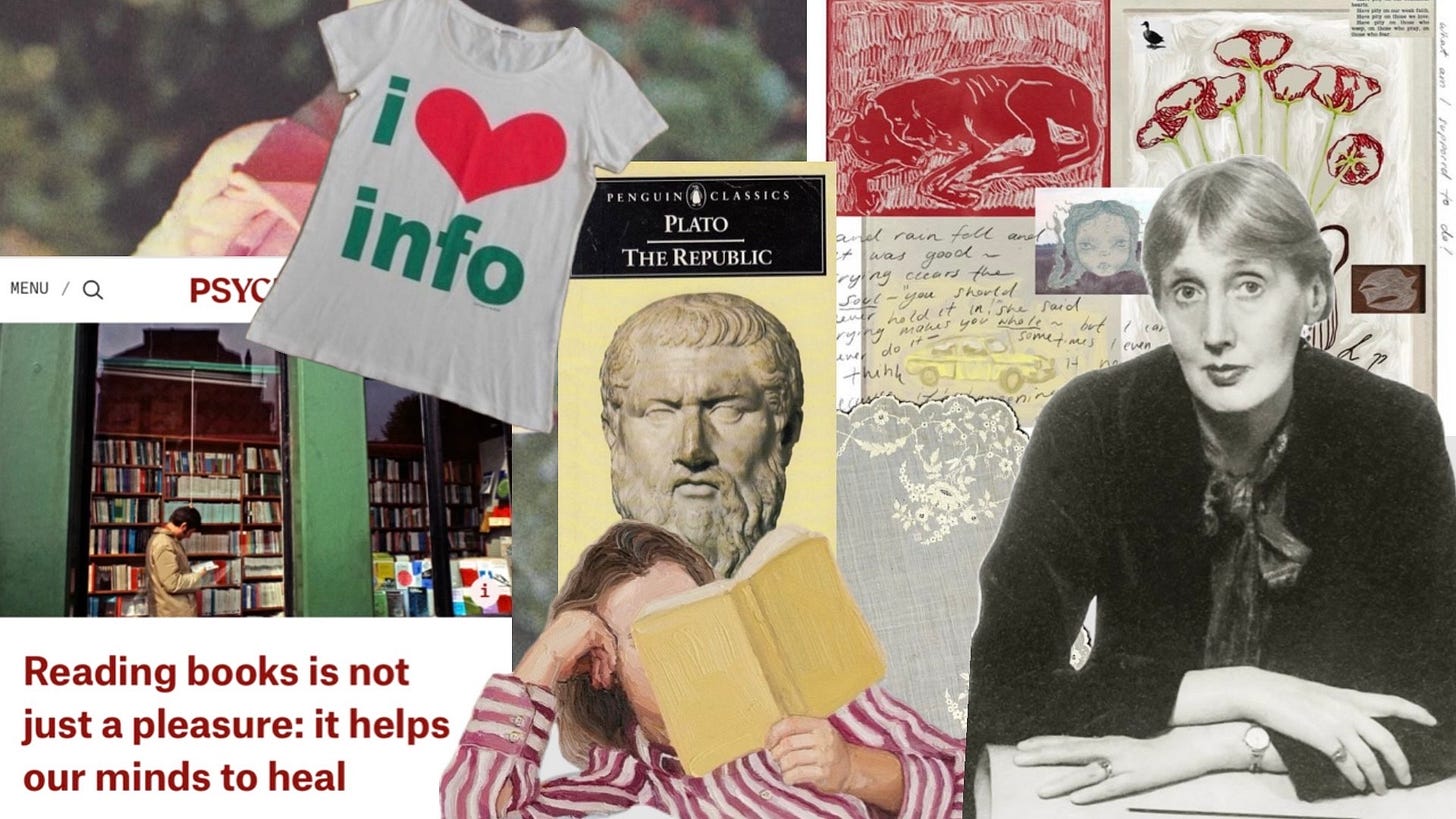
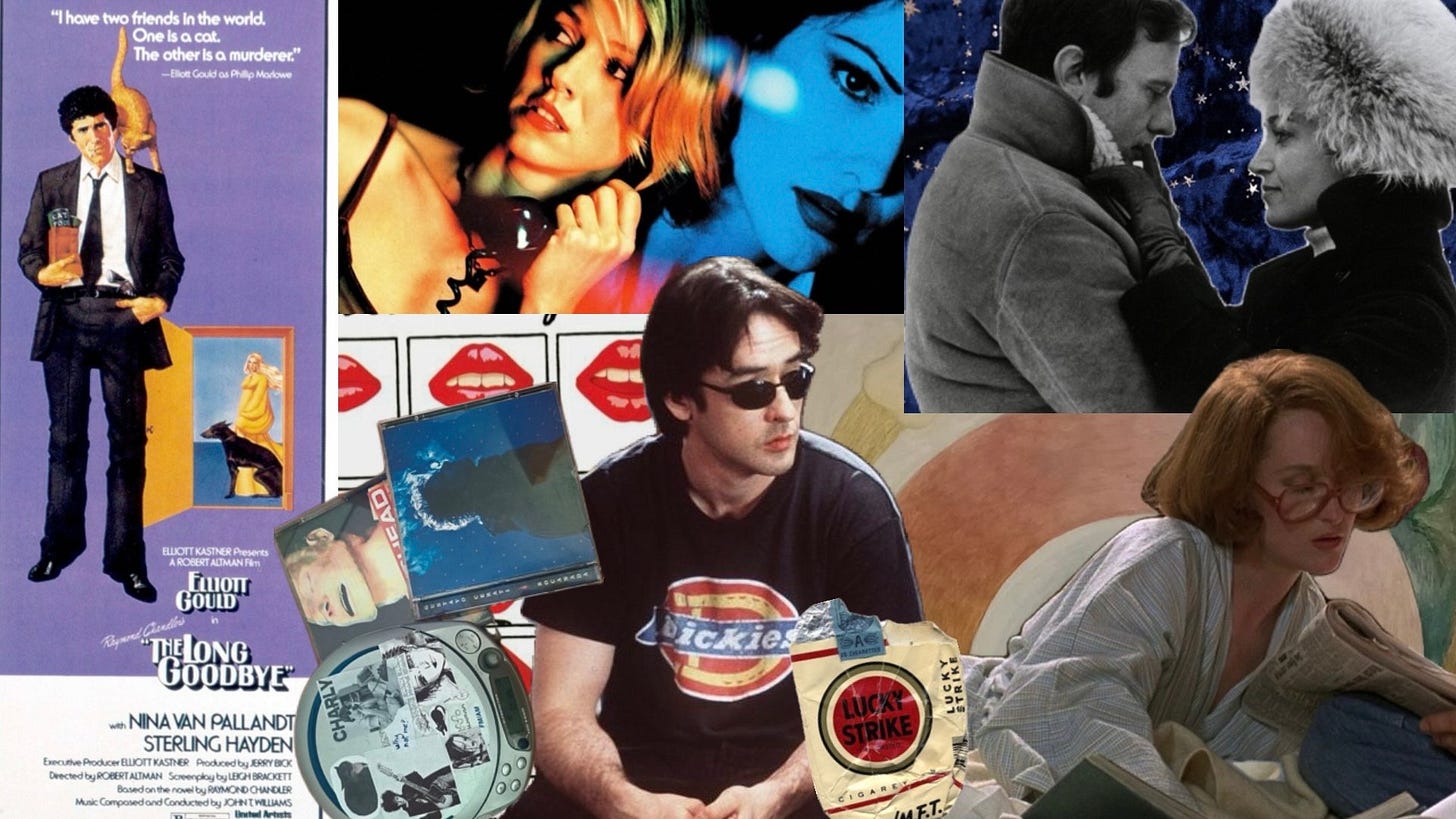
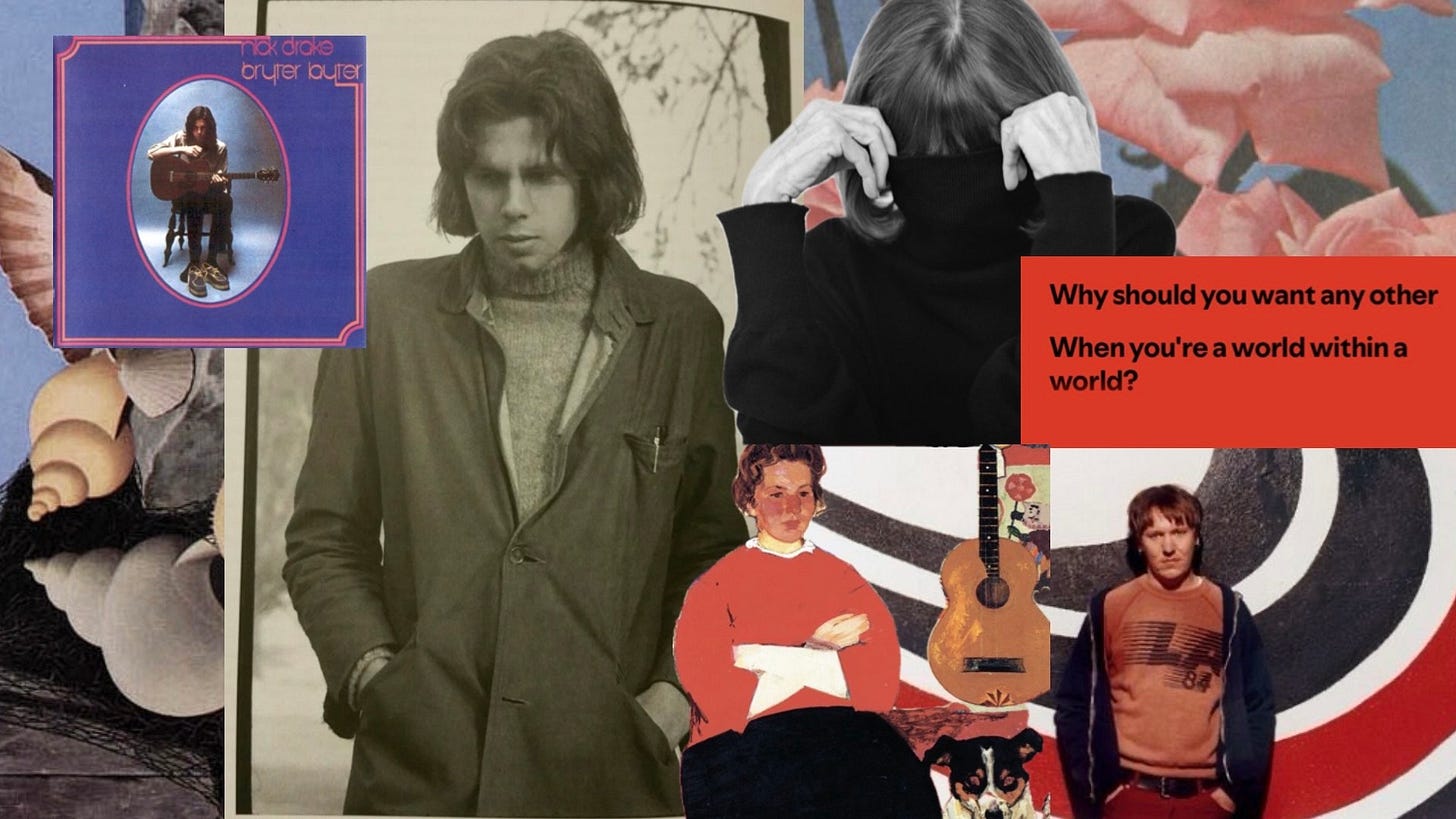
Ma nuit chez maud is the fantastic epitome of the kind of slow-burning, eros-oriented philosophizing of which Rhomer is a master. If you haven’t watched Claire’s Knee already, I highly recommend it.
Also, watching Lynch in order helps! (Skip Dune!)